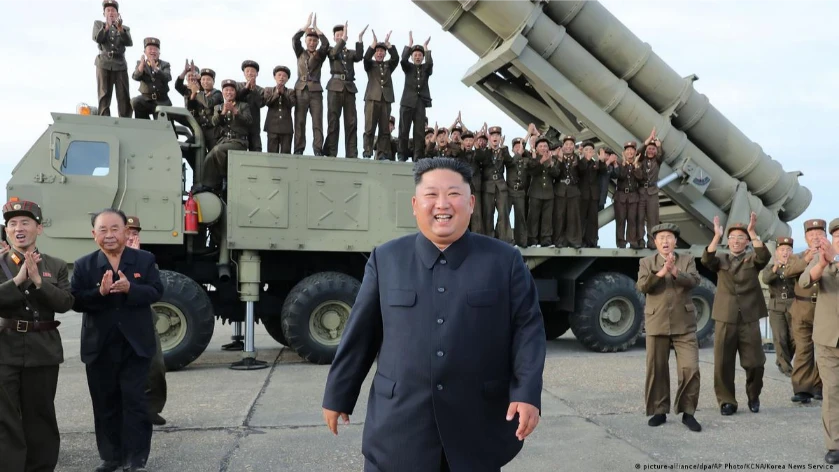In what is seen as a significant development, North Korean leader Kim Jong Un has ordered an acceleration of the country’s war preparations, including its nuclear program, in response to what he describes as “unprecedented confrontational moves” by the United States. This directive was given during a meeting of North Korea’s ruling Workers’ Party and marks a concerning escalation in the already tense situation on the Korean peninsula.
Kim’s announcement, as reported by the state news agency KCNA, emphasizes the urgency of preparing for potential conflict. He outlined specific tasks for the People’s Army, munitions industry, nuclear weapons, and civil defense sectors, indicating a comprehensive approach to militarization. Kim highlighted the “extreme” military situation on the peninsula, attributing it to anti-North confrontations with the U.S.
In reaction to North Korea’s increasing weapons tests and military advancements, South Korea, Japan, and the U.S. have deepened their political and defense cooperation. This includes activating a system for sharing real-time data on North Korean missile launches. Additionally, the U.S. has increased its military presence in the region, with a nuclear-powered submarine arriving in South Korea and deployment of long-range bombers for drills with Seoul and Tokyo.
Pyongyang has made significant, yet worrying, strides in its military capabilities. The successful launch of its first military spy satellite, testing of the Hwasong-18 ICBM, and the constitutional enshrinement of its nuclear status demonstrate its commitment to military modernization. These developments, coupled with the operational status of a second reactor at the Yongbyon nuclear facility, underscore North Korea’s unwavering focus on its nuclear and missile programs.
Kim’s remarks suggest a continued pace of weapons tests and military modernization, possibly aimed at building leverage for future diplomacy with Washington, particularly after the U.S. presidential election in November next year. However, nuclear talks remain stalled since their collapse in 2019 during high-stakes summits with former President Donald Trump.
Despite the military focus, Kim also addressed economic goals for 2024, emphasizing the importance of agriculture and the need to accomplish the country’s five-year development plan. This comes against the backdrop of serious food shortages in North Korea, exacerbated by prolonged border closures during the COVID-19 pandemic.
North Korea’s accelerated war preparations and nuclear advancements present a complex challenge to regional stability and international security. The deepening cooperation between North Korea and Russia, along with the strained U.S.-North Korea diplomatic relations, create a volatile geopolitical environment. The situation requires careful monitoring and a coordinated international response to prevent escalation and ensure regional peace and security.
North Korea’s preparations for war has drawn attention not only from the international community but also from major global players like Russia, China, and Iran.
North Korea has long been a nation shrouded in mystery and known for its aggressive military posturing. Recent intelligence suggests that the nation is preparing for a large-scale military conflict. Such preparations include the enhancement of its nuclear capabilities, ballistic missile tests, and significant troop mobilizations. These developments have raised alarms globally, especially among neighboring countries and the West.
Amidst these developments, North Korea has been strengthening its relationship with Moscow. Kim’s visit to Russia and meeting with President Vladimir Putin, along with concerns over Pyongyang supplying military equipment to Moscow, highlight the expanding strategic cooperation between these nations.
Russia, facing its own set of global challenges, seems to view the situation in North Korea as a strategic opportunity. Reports indicate that Russia may be providing clandestine support to North Korea, seeing it as a counterbalance to Western influence in Asia. This support could include intelligence sharing, military advice, and economic aid, helping North Korea to withstand international sanctions.
China has historically been a close ally of North Korea, often acting as a mediator in international disputes involving the hermit kingdom. However, China’s role is complex, balancing its strategic interests in maintaining a buffer state against Western influence with its desire for regional stability and economic growth. China’s response to North Korea’s war preparations is likely to be cautious, aiming to avoid a full-scale conflict while ensuring its regional interests are safeguarded.
Iran’s involvement is speculated to be in the form of tactical and technological support. Given Iran’s own history with nuclear technology and international sanctions, it is believed that Iran could be sharing critical knowledge and resources with North Korea, further enhancing its military capabilities.
For Western nations, the situation presents a multi-faceted challenge. On one hand, there is the immediate threat of a potential military conflict involving a nuclear-capable North Korea. On the other, there is the broader strategic challenge of dealing with Russia, China, and Iran’s involvement. Western responses may include strengthening alliances in the Asia-Pacific region, increased diplomatic efforts for de-escalation, and potentially, a reevaluation of military strategies.
The situation in North Korea is a reflection of the shifting global order, with old alliances being tested and new ones forming. The involvement of Russia, China, and Iran adds layers of complexity to an already volatile situation. For the West, understanding these dynamics and developing a comprehensive strategy will be crucial in navigating the challenges ahead.
